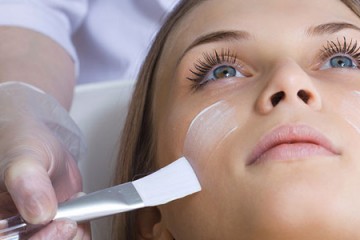The commercial cosmetics industry says it’s safe to put toxic chemicals linked to cancer, infertility or other health problems into personal care products because of the amount in each product is too small to matter. But none of us uses just one product. Think about how many products you use in a single day from toothpaste to soap, shampoo, deodorant, body lotion, shaving products and makeup -how many products you use in a year, and over a lifetime.
Our skin is the largest organ in the body, and easily absorbs what we put on it, yet the skin care and cosmetics industry is unregulated by the FDA. Here is a list of some common toxins to avoid in skin care products, as well as those we use for personal care.
Parabens: very common in skin care, preserve other ingredients and extend a product shelf life, but these antimicrobial chemicals have hormone disrupting effects and are capable of reaching hormonal system and causing cancer.
Petrochemicals: derived from crude oil (petrolatum, mineral oil, paraffin) and may contain known or suspected carcinogens. Avoid any products with myreth, oleth, laureate, ceteareth (or any other eth), PEG, polyethylene, polyethylene glycol, or oxynol.
Hydroquinone: a possible carcinogen and probable neurotoxin and skin sensitizer, and can also cause a skin disease called ochronosis. Found in some skin lightening products, moisturizers and self tanning lotions.
Sulfates: such as sodium laurel and sodium laureth, and are harsh detergents that give cleansers, soaps and shampoos their lather ability.
Phthalates: are commonly uses to stabilize fragrances. They cause kidney damage, are harmful to fetal development, reduce fertility and cause premature breast development in young children. Phthalates are often listed as perfume.
Ureas: are preservatives that have the potential to release formaldehyde, a powerful carcinogen. Formaldehyde exposure can cause arthritic pain, tumours, skin reactions, allergies and many other serious problems.
Mercury: often listed as thimersal, is a possible human carcinogen, and human reproductive or developmental toxin.
Placenta: produces progesterone, estrogen and other hormones that can interfere with the body’s normal hormone functions and can lead to serious health problems like breast cancer when used in cosmetics.
Lead Acetate: is a known human reproductive and developmental toxin. Prohibited from using in cosmetics in Canada and the EU.
Animal Testing: A grim history of cruelty to animals lies behind many cosmetic ingredients. But scientists are developing new technology to test cosmetics, since the ban on animal testing began March 2009 in EU.
